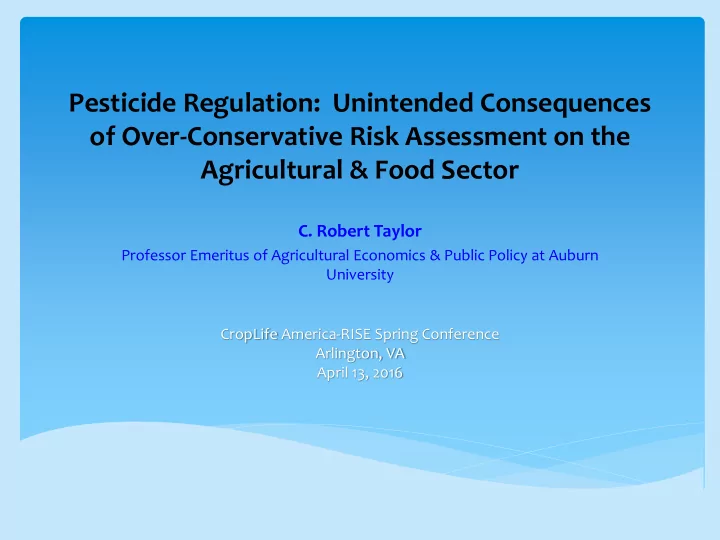

Pesticide Regulation: Unintended Consequences of Over-Conservative Risk Assessment on the Agricultural & Food Sector C. Robert Taylor Professor Emeritus of Agricultural Economics & Public Policy at Auburn University CropLife America-RISE Spring Conference Arlington, VA April 13, 2016
Co nservative (Uncertain) Risk Standards May impose significant unintended risks (and costs) on the food economy Why have a different risk standard for listed species than for the plethora of risks and uncertainty facing the human species? Are FQPA (and other) risks additive as implied by the policy framework?
The Macro or Aggregate World “Everything is Connected to Everything Else” A fundamental ecological principle But also a fundamental characteristic of the aggregate economic system Unintended Consequences May result from a focus on only one part of the household, critters or humans some negative, some positive consequences May result from a focus on static, current impacts, rather than dynamic, long-run impacts May result from a micro policy focus when a macro focus is appropriate
The Macro or Aggregate World Micro-Macro Paradoxes Tendency to reason or analyze issues at the micro level But what appears true at the micro level may have the opposite macro effect e.g. Introduction of a new pesticide that increases crop yield and is profitable for a farmer to use But widespread adoption increases production which lowers crop price In the aggregate, farmers as a group may be worse off While consumers may be better off Unintended and Paradoxical Consequences May apply to “expected” economic and ecological impacts But also apply to “risk” considerations
The Macro or Aggregate World Pesticide and ESA risk assessment While “everything may be connected to everything else,” there is often a total disconnect between aggregate economic models, and ecological and environmental models Ecologists and economists are seemingly on different planets! Often a disconnect between FQPA or ESA risk assessment, and more mundane economic risks affected by policy e.g. Higher food prices resulting from ESA or FQPA action that bans use of a pesticide or takes land out of crop production May result in an inadequate diet for low income people, with attendant health risks Typically results in increased food imports that may have higher residues or unhealthy contaminants Disconnect partly due to legislation, but may also be due to agency and court interpretations
Risk or Uncertainty? A Distinction Risk: Can assign probabilities and use decision models grounded in economics and statistics Uncertainty: Difficult or impossible to assign probabilities, even subjective Considerable rhetoric about using the “best science” in pesticide decisions B ut there is considerable “uncertainty” about that science (including social science) Uncertainty about validity of some ecological (and economic) theories
Are Risks Additive, as Implied by the Risk Cup? NO! “Everything connected to everything else” strongly suggests joint probability distributions Risks to species or to the food system arising from different sources are not additive as implicitly assumed in the FQPA (and other) Risk Cup In terms of uncertain risks, broadly defined, the whole may be greater than the sum of the parts .... or it may be less!
Common View of the FQPA Risk Cup
Non-additivity of risks can be likened to a chemical reaction that occurs in the cup
The Risk Cup is Best Viewed as an Uncertain Risk Cup
ESA Mitigation Costs Include Direct expenditures Indirect and/or unintended economic costs Higher food prices Lower farm income General (non-ESA) Risk premium/discounts
Basic Economics: Mitigation Cost & Risk Tradeoffs Unreasonable above frontier Mitigation Cost Mitigation Cost Frontier Unattainable High Risk Low Risk ESA Assessed (uncertain) Risk for a Species
Consequences of Reducing ESA Species Risks Mitigation Cost Mitigation Cost Frontier Assessed Risk Negligible Risk Zero without Intervention with Intervention Risk ESA Assessed (uncertain) Risk for a Species
Possible Outcome of ESA Policy Choices Mitigation Cost Optimal Mitigation Cost Frontier Negligible Risk Assessed Risk Zero with Intervention without Intervention Risk (policy goal)
Different Species, Different Mitigation Costs Mitigation Cost Frontier Species 1 Mitigation Cost Mitigation Cost Frontier Species 2 Assessed Risk Zero without Intervention Risk ESA Assessed (uncertain) Risk for a Species
Different Costs Suggest Different Risk Standards Mitigation Cost Frontier Species 1 Mitigation Cost Mitigation Cost Frontier Species 2 Assessed Risk Zero without Intervention Risk ESA Assessed (uncertain) Risk for a Species
Conservative (Uncertain) Risk Standards for ESA May impose significant risks (and costs) on the food economy Why have a different risk standard for listed species than for the plethora of risks and uncertainty facing the human species? What would be the economic and ecological consequences of using a highly conservative risk standard for other policy decisions? FQPA Food policy etc
Challenges Modeling of uncertain risks, and uncertain economic and ecological effects is quite challenging Ecologists and economists need to get on the same planet! Identifying and measuring the “major” unintended consequences and paradoxical effects to reduce “surprises” after a policy has been implemented For risks as well as expected consequences Cannot chase down every aggregate economic and ecological effect Even if we could, it would not likely be a sound social investment, as the costs of such an exercise would likely be much greater than expected benefits of fine-tuning policy But we can do more, which will likely have beneficial social, economic and ecological outcomes
Recommend
More recommend